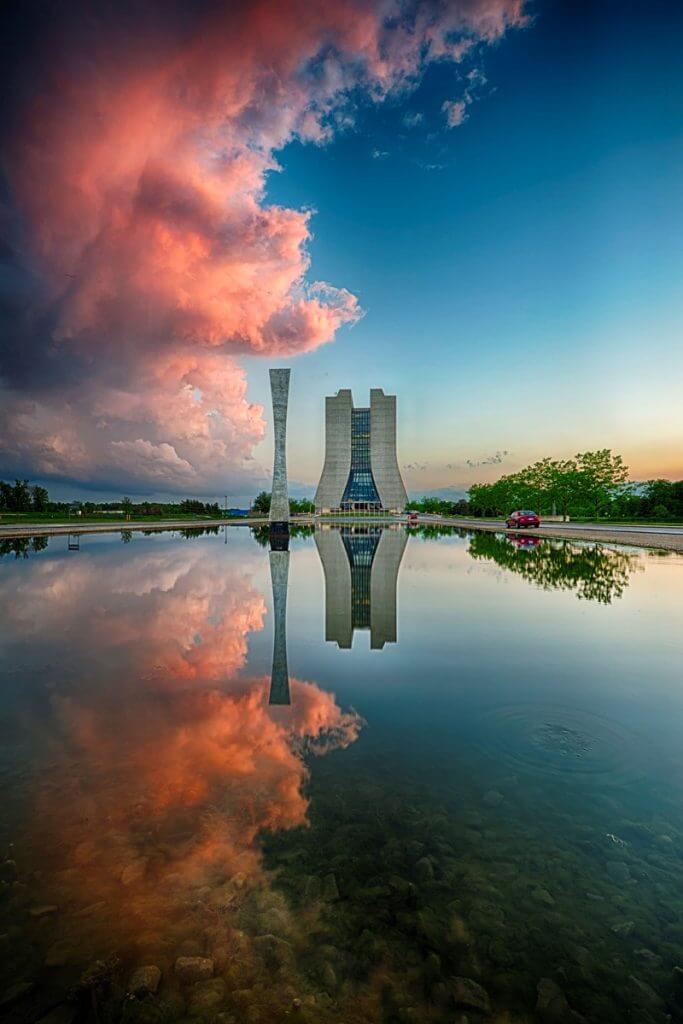A team of NIU physicists has joined the Deep Underground Neutrino Experiment (DUNE), a collaboration of scientists from more than 140 laboratories and universities in 27 countries who aim to demystify an enigmatic elementary particle known as the neutrino.
Neutrinos are among the most abundant particles in the universe–so prevalent that a trillion pass through your body each second. Despite being all around us, neutrinos rarely interact with other matter and are very difficult to observe.
DUNE is envisioned as a “game-changing” experiment that will help shape scientific understanding of the particle. The goal is to achieve discoveries relating to the origins and evolution of the universe by observing what happens to neutrinos as they are beamed underground (including through a portion the earth’s mantle) to a detector 800 miles away.
The journey will begin at Fermi National Accelerator Laboratory in Batavia and culminate at a massive particle detector that will be built a mile underground at Sanford Lab in South Dakota.
Led by physics professor Vishnu Zutshi, NIU’s contingent earned its spot in the Deep Underground Neutrino Project during the spring. Faculty, graduate students and undergraduates affiliated with NIU’s Northern Illinois Center for Accelerator and Detector Development will team up with about 800 scientists on the project.
Zutshi described the DUNE collaboration as a one-of-a-kind experiment with exciting research and development opportunities, not to mention a potentially “huge physics payoff” in neutrino physics and particle astrophysics.
“The NIU high energy physics group is excited to delve deeper into neutrino physics, so it is exhilarating to be initiating our involvement in this direction,” Zutshi said.
Added fellow NIU physics professor Michael Eads, “It’s certainly prestigious to be part of the world’s biggest physics construction project over the next 10 years.”
DUNE is certainly large in many facets beyond the sheer number of scientists involved.
 Neutrinos may play a key role in solving the mystery of how the universe came to consist of matter rather than antimatter, which was abundant in the moments after the Big Bang. They could also unveil new, exotic physical processes.
Neutrinos may play a key role in solving the mystery of how the universe came to consist of matter rather than antimatter, which was abundant in the moments after the Big Bang. They could also unveil new, exotic physical processes.
With an experiment of this size and duration—the first beam isn’t expected to be sent until 2026—Eads said manageable small-scale tasks are designated to various institutions in the collaboration. For NIU’s team, that means a role in the photon detector system.
“The current focus is designing the quality control procedures to build a prototype detector that will be located at the CERN Laboratory in Geneva, Switzerland,” Eads said. “Construction of the detector is expected to begin late this year and data-taking will begin in 2018. Quality control testing for the photon sensors will take place at NIU.”
Having designated tasks and a schedule make it possible to figure out how to get students involved in the experiment.
“It allows our students at both the graduate and undergraduate level to get a real hands-on feel for frontier scientific research and then go immerse themselves in it,” Zutshi said. “The technical and analytical skills they acquire are not only useful in academia, but are in high demand in industry.”
Eads said the collaboration also marks another chapter in the ongoing relationship between NIU and Fermilab on “cutting-edge, world-leading particle physics experiments.” The benefits include involvement in projects that could not be tackled by NIU alone.
“The close interaction with the national labs has allowed NIU to take on projects that normally could not have been undertaken with just the NIU infrastructure and facilities,” Zutshi added.
The feeling of value is mutual.
“Northern Illinois University has been a strong partner in Fermilab’s work for decades, and we’re pleased that they are joining the DUNE experiment, which is an exciting new international initiative for neutrino science,” Fermilab Deputy Director Joe Lykken said. “It’s the logical next step in what has been a fruitful relationship, on both sides, with one of our closest neighbors.”
Contact: Tom Parisi, NIU Newsroom


